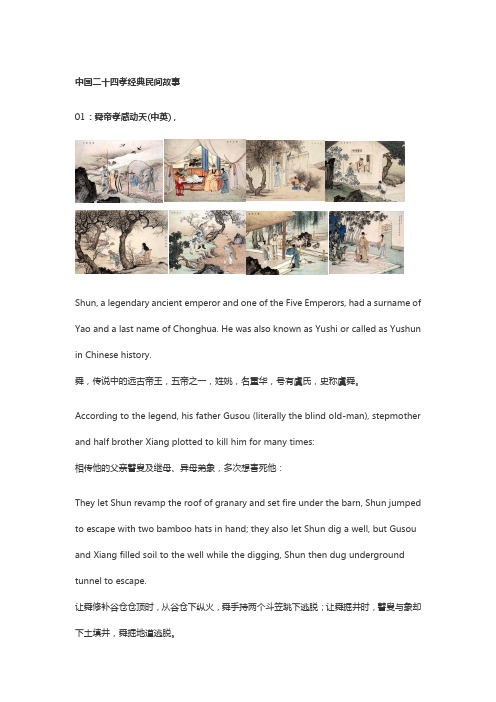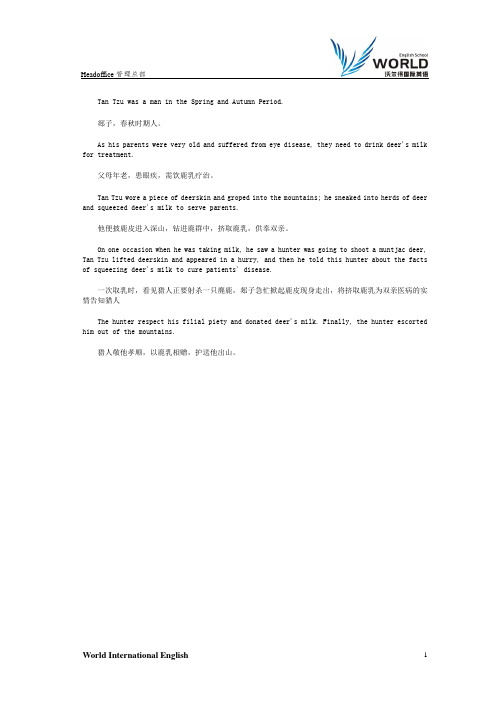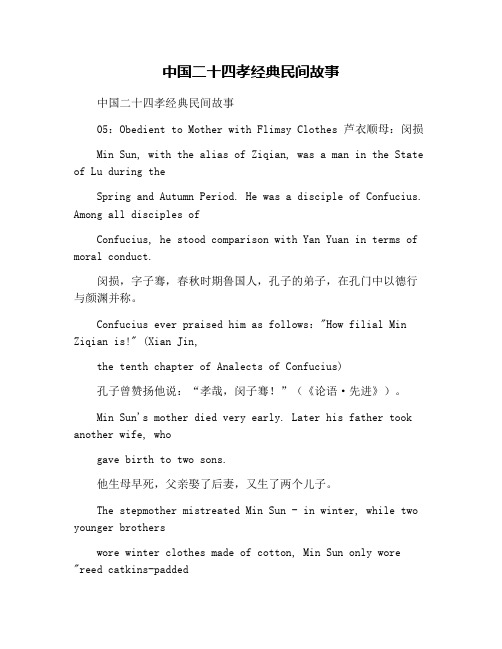中国二十四孝双语故事
- 格式:doc
- 大小:25.00 KB
- 文档页数:2

中国二十四孝经典民间故事01:舜帝孝感动天(中英),Shun, a legendary ancient emperor and one of the Five Emperors, had a surname of Yao and a last name of Chonghua. He was also known as Yushi or called as Yushun in Chinese history.舜,传说中的远古帝王,五帝之一,姓姚,名重华,号有虞氏,史称虞舜。
According to the legend, his father Gusou (literally the blind old-man), stepmother and half brother Xiang plotted to kill him for many times:相传他的父亲瞽叟及继母、异母弟象,多次想害死他:They let Shun revamp the roof of granary and set fire under the barn, Shun jumped to escape with two bamboo hats in hand; they also let Shun dig a well, but Gusou and Xiang filled soil to the well while the digging, Shun then dug underground tunnel to escape.让舜修补谷仓仓顶时,从谷仓下纵火,舜手持两个斗笠跳下逃脱;让舜掘井时,瞽叟与象却下土填井,舜掘地道逃脱。
Afterwards, Shun didn't resent and was still humble to his father and loved his younger brother.事后舜毫不嫉恨,仍对父亲恭顺,对弟弟慈爱。

二十四孝图主要内容双语:芦衣顺母:闵损中国二十四孝经典民间故事05:Obedient to Mother with Flimsy Clothes 芦衣顺母:闵损Min Sun, with the alias of Ziqian, was a man in the State of Lu during the Spring and Autumn Period. He was a disciple of Confucius. Among all disciples of Confucius, he stood comparison with Yan Yuan in terms of moral conduct. Confucius ever praised him as follows:"How filial Min Ziqian is!" (Xian Jin, the tenth chapter of Analects of Confucius)闵损,字子骞,春秋时期鲁国人,孔子的弟子,在孔门中以德行与颜渊并称。
孔子曾赞扬他说:“孝哉,闵子骞!”(《论语·先进》)。
Min Sun's mother died very early. Later his father took another wife, who gave birth to two sons.The stepmother mistreated Min Sun - in winter, while two younger brothers wore winter clothes made of cotton, Min Sun only wore "reed catkins-padded cotton clothes."他生母早死,父亲娶了后妻,又生了两个儿子。
继母经常虐待他,冬天,两个弟弟穿着用棉花做的冬衣,却给他穿用芦花做的“棉衣”。

PAGE Tan Tzu was a man in the Spring and Autumn Period.郯子,春秋时期人。
As his parents were very old and suffered from eye disease, they need to drink deer's milk for treatment.父母年老,患眼疾,需饮鹿乳疗治。
Tan Tzu wore a piece of deerskin and groped into the mountains; he sneaked into herds of deer and squeezed deer's milk to serve parents.他便披鹿皮进入深山,钻进鹿群中,挤取鹿乳,供奉双亲。
On one occasion when he was taking milk, he saw a hunter was going to shoot a muntjac deer, Tan Tzu lifted deerskin and appeared in a hurry, and then he told this hunter about the facts of squeezing deer's milk to cure patients' disease.一次取乳时,看见猎人正要射杀一只麂鹿,郯子急忙掀起鹿皮现身走出,将挤取鹿乳为双亲医病的实情告知猎人The hunter respect his filial piety and donated deer's milk. Finally, the hunter escorted him out of the mountains.猎人敬他孝顺,以鹿乳相赠,护送他出山。

中国二十四孝经典民间故事中国二十四孝经典民间故事05:Obedient to Mother with Flimsy Clothes 芦衣顺母:闵损Min Sun, with the alias of Ziqian, was a man in the State of Lu during theSpring and Autumn Period. He was a disciple of Confucius. Among all disciples ofConfucius, he stood comparison with Yan Yuan in terms of moral conduct.闵损,字子骞,春秋时期鲁国人,孔子的弟子,在孔门中以德行与颜渊并称。
Confucius ever praised him as follows:"How filial Min Ziqian is!" (Xian Jin,the tenth chapter of Analects of Confucius)孔子曾赞扬他说:“孝哉,闵子骞!”(《论语·先进》)。
Min Sun's mother died very early. Later his father took another wife, whogave birth to two sons.他生母早死,父亲娶了后妻,又生了两个儿子。
The stepmother mistreated Min Sun - in winter, while two younger brotherswore winter clothes made of cotton, Min Sun only wore "reed catkins-paddedcotton clothes."继母经常虐待他,冬天,两个弟弟穿着用棉花做的冬衣,却给他穿用芦花做的“棉衣”。

中国二十四孝经典民间故事汇总贴(中英对照)中国二十四孝经典民间故事汇总贴(中英对照)《二十四孝》全名《全相二十四孝诗选》,是元代郭居敬编录,一说是其弟郭守正,第三种说法是郭居业撰。
二十四孝包含二十四个关于孝顺的故事,下列表为二十四孝故事中英对照汇总。
中国二十四孝经典民间故事汇总贴(中英对照)中国二十四孝经典民间故事01:舜帝孝感动天(中英)中国二十四孝经典民间故事02:汉文帝刘恒亲尝汤药(中英)中国二十四孝经典民间故事03:曾参啮指痛心(中英)中国二十四孝经典民间故事04:仲由百里负米(中英)中国二十四孝经典民间故事05:闵损芦衣顺母(中英)中国二十四孝经典民间故事06:郯子鹿乳奉亲(中英)中国二十四孝经典民间故事07:老莱子戏彩娱亲(中英)中国二十四孝经典民间故事08:董永卖身葬父(中英)中国二十四孝经典民间故事09:丁兰刻木事亲(中英)中国二十四孝经典民间故事10:江革行佣供母(中英)中国二十四孝经典民间故事11:陆绩怀橘遗亲(中英)中国二十四孝经典民间故事12:郭巨埋儿奉母(中英)中国二十四孝经典民间故事13:黄香扇枕温衾(中英)中国二十四孝经典民间故事14:蔡顺拾葚异器(中英)中国二十四孝经典民间故事15:姜诗涌泉跃鲤(中英)中国二十四孝经典民间故事16:王裒闻雷泣墓(中英)中国二十四孝经典民间故事17:崔山南乳姑不怠(中英)中国二十四孝经典民间故事18:王祥卧冰求鲤(中英)中国二十四孝经典民间故事19:吴猛恣蚊饱血(中英)中国二十四孝经典民间故事20:孟宗哭竹生笋(中英)中国二十四孝经典民间故事21:杨香扼虎救父(中英)中国二十四孝经典民间故事22:庾黔娄尝粪忧心(中英)中国二十四孝经典民间故事23:朱寿昌弃官寻母(中英)中国二十四孝经典民间故事24:黄庭坚涤亲溺器(中英)。

中国二十四孝民间故事下面店铺为大家带来中国二十四孝民间故事,欢迎大家阅读!中国二十四孝民间故事:郭巨埋儿奉母Guo Ju was a man of Longlv (today's Linzhou, Anyang, Henan) or of Wen County in Henei (today's southeast of Wen County, Henan) in the East Han Dynasty. His family's financial situation was originally well-off.郭巨,晋代隆虑(今河南林县)人,一说河内温县(今河南温县西南)人,原本家道殷实。
After his father died, he divided the family property into two for his two younger brothers and supported his mother by himself.父亲死后,他把家产分作两份,给了两个弟弟,自己独取母亲供养,对母极孝。
He was very pious to his mother and later his family's financial situation went worse gradually. His wife gave birth to a boy and he was afraid that supporting this child would affect supporting his mother.后家境逐渐贫困,妻子生一男孩,郭巨担心,养这个孩子,必然影响供养母亲So he said to his wife: "Children can be reborn but Mother cannot relive after death. It would be better for us to bury the son and save some food for Mother."遂和妻子商议:“儿子可以再有,母亲死了不能复活,不如埋掉儿子,节省些粮食供养母亲。
英语作文二十四孝**English Content:**The 24 Paragons of Filial Piety is a traditional Chinese storybook that highlights the virtues of filial piety towards one's parents. This collection of stories, dating back to ancient times, serves as a moral guide for the younger generation, teaching them the importance of respecting, caring for, and honoring their parents. Each story tells of a son or daughter who goes above and beyond to fulfill their filial duties, exhibiting unwavering devotion and dedication towards their parents.The first story, "Filial Piety of Dong Yong," tells of a man who sold himself into slavery to provide for his mother's needs. Dong Yong's act of sacrifice and love for his mother set the tone for the remaining stories, each one illustrating a different aspect of filial piety."Yang Hui's Loyalty to His Parents" highlights the importance of staying by one's parents' side, even in times of adversity. Yang Hui, despite facing financialdifficulties, refused to leave his blind father alone, choosing to care for him instead.The story of "Lao莱衣顺母" emphasizes patience and understanding towards one's aging parents. Lao莱衣,despite being mocked for his actions, remained unperturbed, knowing that his mother needed his companionship and care. These stories, along with the other seventeen paragons, are not just tales of the past but serve as timeless reminders of the value of filial piety. They teach us that our parents are not just our caretakers but our teachers, mentors, and role models. Their love,牺牲, and guidance shape us into the individuals we become.In today's fast-paced world, where technology and material possessions often overshadow human values, the 24 Paragons of Filial Piety reminds us to cherish and appreciate our parents. It encourages us to prioritize our relationships with them, to spend quality time with them, and to fulfill our filial duties with love and respect.The lessons learned from these paragons are not limited to the Chinese culture but are universally applicable.Filial piety is a universal virtue that transcends culturaland geographical boundaries, teaching us to value and respect our elders, regardless of their background or circumstances.In conclusion, the 24 Paragons of Filial Piety is a timeless collection of stories that serve as a powerful reminder of the importance of filial piety. These stories, with their deep-rooted moral values, continue to inspire and guide individuals of all ages, reminding us of the fundamental role our parents play in shaping our lives and the crucial need to cherish them always.**Chinese Content:**《二十四孝》是一部传统的中国故事集,强调了子女对父母尽孝的重要性。
PAGE Cai Shun was a man in Runan (today's Henan) of the Han Dynasty. His father died when he was young and he was very pious to his mother.蔡顺,汉代汝南(今属河南)人,少年丧父,事母甚孝。
His time coincided with the Chaos Caused Wang Mang and famine and living expenses were very high. He could not but pick mulberries as food for himself and his mother.当时正值王莽之乱,又遇饥荒,柴米昂贵,只得拾桑葚母子充饥。
One day, he encountered the Red-Brow Army and the solders asked him: "Why do you put red mulberries and black mulberries into two baskets separately?"一天,巧遇赤眉军,义军士兵厉声问道:“为什么把红色的桑葚和黑色的桑葚分开装在两个篓子里?”Cai Shun answered: "The black mulberries are for my mother and the red mulberries are for myself." 蔡顺回答说:“黑色的桑葚供老母食用,红色的桑葚留给自己吃。
”The solders had compassion for his piety and gave him two deciliters of rice and one bovine hoof in respect.赤眉军怜悯他的孝心,送给他三斗白米,一头牛,带回去供奉他的母亲,以示敬意。
2482020年13期总第505期ENGLISH ON CAMPUS中国孝道史中女性社会身份的译介——以《二十四孝》6个英译本为例文/李嘉怡妻子的悲不自胜和万般无奈,让读者产生同理心。
卫本和杨本分别用 “did not venture to object to the proposal” 和 “was afraid to stop him” 来体现妻子的不敢不从,害怕大于伤痛,淋漓尽致地展现了女性对丈夫的绝对服从。
笔者认为,卫本和杨本更能体现出女性在婚姻中听命于男性。
3. 继母形象。
原文:父娶后母,生二子,衣以棉絮;妒损,以衣芦花。
——《芦衣顺母》《芦衣顺母》故事中的继母给两个亲儿子穿着用棉花填絮做的冬衣,因为厌弃闵损,给他穿用芦花填絮的“绵衣”。
释本只字未提芦花替代棉花做冬衣这件事,而是通过增译渲染后母对闵损的厌恶表现 —— 恶语相加 (cruel words),态度粗暴 (harsh treatment),让继子挨饿受冻 (Min Dz Chyan often went cold and hungry),孤立继子 (suffered from loneliness)。
陈本没有准确翻译出“芦花”和“棉衣”两个词,而是用了 “new wadded coat” 和 “gave nothing to” 来替代。
焦本、卫本、杨本和史本则都忠实译出了“衣以棉絮”,但“芦花”的表达却出现了差异:第一种,是焦本和卫本选择的rushes;另一种,是杨本和史本选择的reedflower或reed catkins。
原文的芦花应该是指禾本科植物芦苇的花,因此应该翻译为reedflower 或 reed catkins,即杨本和史本的译法是正确的。
三、结语本文选取了《二十四孝》故事的小众角色——女性作为研究重点,试评析六个英译本对女性身份的译介效果。
在讨论的三种女性社会身份中,杨本将其译得最到位,其次是焦本和卫本。
在中国封建社会中的女性,不仅没有婚姻自主权,还要在婚姻中服从于男性,尽孝于长辈,遵循妻妾有别的行为准则。
汉文帝刘恒亲尝汤药(中英)
During the Western Han Dynasty in China, after its founding patriarch Liu Bang died, the throne came by succession to his son, "Liu Heng".
西汉年间,建国皇帝刘邦死后,他的儿子刘恒继承了王位•。
He earned the name Han Wendi, "The Learned Emperor of Han". As a ruler, he practiced vigorous, just government, and he loved the citizens, moving and inspiring them to self improvement through education.
他自称汉文帝,即“有学问的汉朝皇帝”。
作为国家统治者,爱民,全身心的鼓励老百姓通过教育来兴旺人丁。
State business was extremely complex and demanding of time, nonetheless he still found time to serve his mother with respectful, filial devotion. He was neither careless nor tardy in his treatment of his mother.
尽管国事繁忙,他仍然侍奉母亲从不懈怠。
Once the matron suffered a serious illness and Han Wendi, as soon as he had completed the various governmental matters , would immediately leave the state chambers and return to his mother's bedside to nurse her with tender concern.
母亲一次严重的疾病,汉文帝放下公事,立刻离开朝廷回到母亲身边照顾母亲。
She was sick for a full three years, and his care was constant and untiring. He waited on her by night and day throughout her convalescence, without relaxing his vigilance in the least. He never grumbled or resented the toil and tedium.
母亲卧病三年,他常常日夜照顾母亲,衣不解带
The Emperor's care of his mother was thorough to the last detail. He would wait by her bedside without closing his eyes, often forgetting to change his robes for long Periodst afraid that he might be remiss in his nursing care.
汉文帝照顾母亲非常细心,在母亲床边,目不交睫,以至于常常忘记换衣服。
As soon as the servants had prepared any dose of medicine, the Emperor would first sample the mixture himself, to make sure it was neither too hot nor too weak. As soon as it was fit to drink, he would spoon-feed the mixture himself to his mother.
当仆人准备好了药后,他亲口尝过后才放心让母亲服用。
Many years passed, and the Learned Emperor nursed his mother throughout.
多年以来,他都坚持照顾母亲。
He earned the praises of all the citizens. An outstanding leader, he was also a most unusual, filially-devoted son, and set the standards of behavior towards parents.
他深得民心。
他不仅是位优秀的皇帝,还是个非常孝顺母亲的儿子,成为孝顺父母的典范。
The people of China respected him, and accepted his teaching. They were deeply influenced and transformed by his model of virtue.
中国人钦佩他,向他学习。
他深刻的影响影响着孝顺美德的继承。
The people in their turn, practiced filial respect towards their parents, and treated them well.
人们应该学习孝顺的尊重和善待自己的父母。
The Learned Emperor's name, Han Wendi, has passed down through a thousand ages to the present--people still admire his model of virtuous, selfless conduct.
孝子汉文帝,虽已逝去,人们仍然敬仰汉文帝善良,无私孝顺母亲的行为。